| |
Rhinoceros
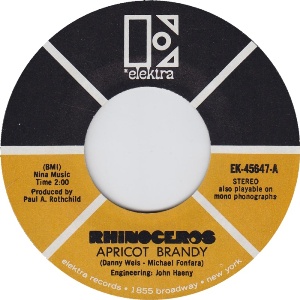
Apricot Brandy / When You Say You're Sorry - 7"
Elektra - 1969
Michael Panontin
|
Michael Fonfara is not exactly the first person to come to mind when you hear the word 'legendary'. Nor, I suppose, are many of the bands he played in, from Jon and Lee and the Checkmates and Rhinoceros in the sixties and early seventies to eighties R&B stalwarts the Lincolns. But judging by the torrent of accolades that poured in upon his passing in early 2021, the veteran keyboardist was held in high esteem by the Canadian music establishment.
The Fort Erie (ON) native studied classical piano at the Royal Conservatory of Music in Toronto before diving into the burgeoning R&B scene there with Lee Jackson and the Checkmates in 1963. That group would alter their name to Jon and Lee and the Checkmates the following year when a teenaged John Finley was added on vocals. After just one single, 1967's 'Bring It Down Front' (as the Jon-Lee Group), Fonfara left to join the Electric Flag, replacing founding member Barry Goldberg on the keys and appearing on their groundbreaking A Long Time Comin' LP.
His stint in Michael Bloomfield's supergroup was brief. In late '67 Fonfara ran into Finley in Los Angeles, who told him about a sort of handpicked supergroup that Elektra honcho Paul A. Rothchild was putting together. Rothchild was no stranger to the pair, having travelled to Toronto early on to see Jon and Lee and the Checkmates perform.
"Paul came to see us play in the fall of '65," Finley told Nick Warburton in 2002. "He came to the Avenue Road club The Devil's Den and told us he wanted to bring us to Elektra Records, but we had a lot of labels after us at that point. He remained a fan and used to come and see us and other groups, like Luke and the Apostles and, of course, Levon and the Hawks. We maintained a friendship with him."
That friendship certainly must have come in handy at the auditions, which Finley described as "scary as hell...like a cattle call". When he arrived for the Dec. 1 ('67) tryout, at a house in Laurel Canyon, he looked around and saw a daunting collection of skilled songwriters. But what Finley may have lacked in compositional skills, he more than made up for in confidence. "I was totally intimidated. I had written a little, but I was a singer and I was the best singer there. [Paul] knew it from having seen me in the Checkmates; and he knew that nobody else could deliver that kind of thing."
It was just a few weeks later that Fonfara, who had been nudged out of the Electric Flag after getting busted for smoking pot, ran into Finley at the Tropicana Motel and was subsequently coaxed into the fold. The two Canadians were joined by second vocalist Alan Gerber, guitarists Danny Weis and Doug Hastings, bassist Jerry 'The Bear' Penrod and drummer Billy Mundi in a group that would call itself Rhinoceros (so named, according to Finley, because the bass and drums on the initial tapes sounded "lumbering and fat...just like a rhinoceros".)
Rhinoceros' self-titled debut that year was a hit-and-miss affair. Despite its impeccable musicianship and production - the latter hardly a surprise given that Rothchild was at the controls - Rhinoceros suffered from a paucity of ideas, most notably the anemic songwriting. Ironically, the record's strongest track and the band's highest charting single was a two-minute instrumental co-penned by Fonfara, one of the few writing credits he had with the band.
'Apricot Brandy' was issued in the US in January 1969. It's a raucous funk throwdown that unsurprisingly showcases the skills of its two writers, with Weis' down-and-dirty guitar licks battling it out with Fonfara's sinewy organ. At a terse 1:57, 'Apricot Brandy' was as radio-friendly as Rhinoceros would get, and by February 22nd the record had entered the Billboard Hot 100 list, ultimately climbing to a respectable #46 position. In fact, one poster on the 45cat site wrote that the single was "a WNEW-FM staple in the early 70s in Noo Yawk...played incessantly and nobody knew who it was."
Fonfara, Finley and Weis would issue an LP as Blackstone in 1973. But Fonfara's greatest gig would come the following year when he joined on as Lou Reed's go-to keyboardist, beginning with Sally Can't Dance and continuing all the way to 1980's Growing Up in Public (where he amazingly received co-writer and co-producer credits on the entire album). Add to that stints in Rough Trade, Foreigner, the aforementioned Lincolns and the Downchild Blues Band and it all adds up to a pretty impressive career.
When Fonfara lost his battle with cancer on January 8, 2021 at the age of 74, the obituaries were effusive in their praise for the talented musician, perhaps none more so than that from Late Show bandleader Paul Shaffer, who was known to give 'Apricot Brandy' the occasional run-through on the show.
"Michael was an early inspiration of mine, since I saw him at The Hawk's Nest teen nightclub in Toronto in about 1966, with Jon and Lee and The Checkmates," Shaffer told FYI Music news. "I never forgot it. I sat in on his gig with the Downchild Blues Band when they played outdoors on Bloor Street at Toronto Jazzfest. He was sweet as pie, and a gas on organ! I asked him about the funk instrumental 'Apricot Brandy'. 'How do you play it right?,' I wanted to know. A few weeks later, he emailed me my answer in a video of him playing it, breaking it down for me. Sometimes, you meet your heroes and they're princes."
|
|
Suggestions
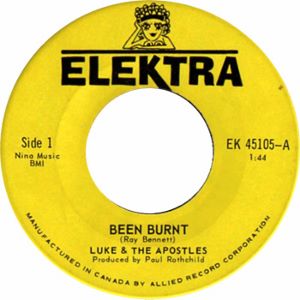
Luke and the Apostles
Been Burnt / Don't Know Why - 7"
Elektra

Painter
West Coast Woman / Space Truck - 7"
Elektra
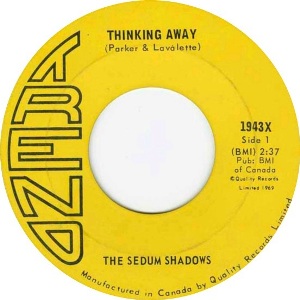
The Sedum Shadows
Thinking Away / Anatomy of a Shadow - 7"
Trend
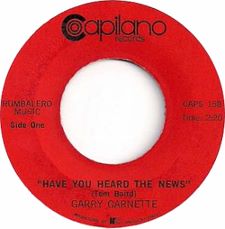
Garry Garnette
Have You Heard the News / Sick and Tired - 7"
Capilano
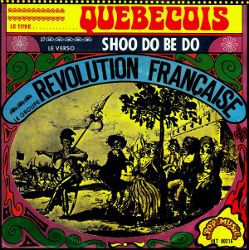
La Revolution Francaise
Quebecois / Shoo-Doo-Bee-Do - 7"
Revolution
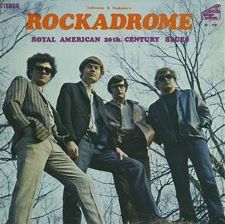
Rockadrome
Royal American 20th Century Blues
Sound Canada
|








